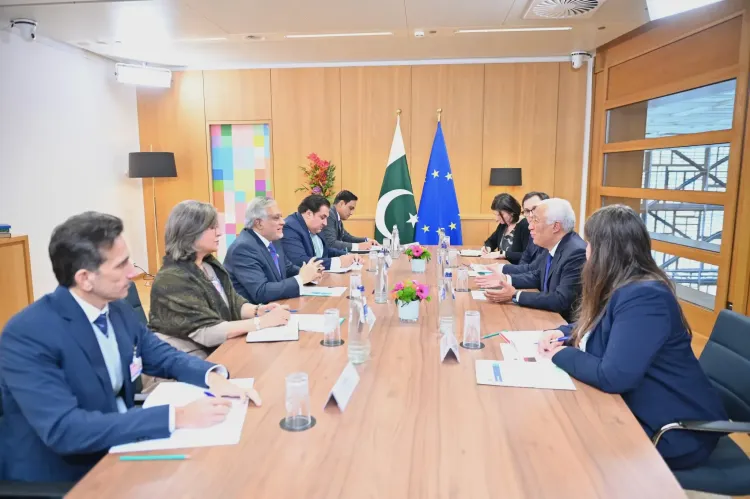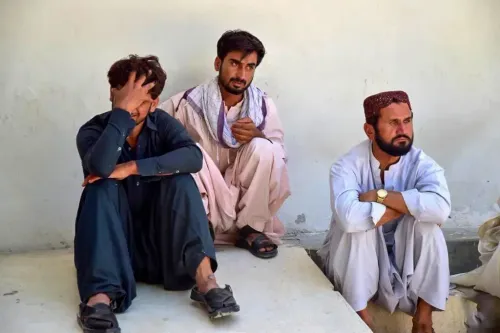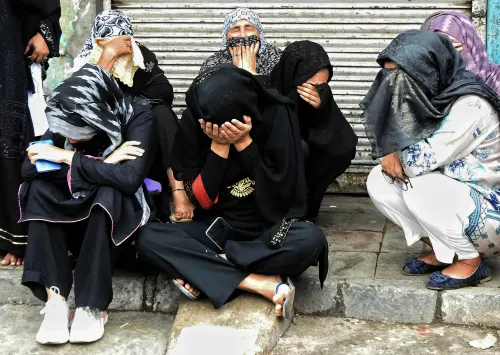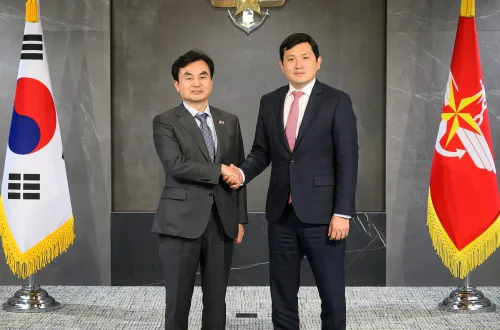Is it time for the EU to hold Pakistan accountable for political imprisonments, election fraud, and terror financing?

Synopsis
Key Takeaways
- Pakistani Foreign Minister Ishaq Dar is in Brussels for the EU Indo-Pacific Forum.
- The upcoming EU report will assess Pakistan's compliance with GSP+.
- Serious allegations include political imprisonments and terror financing.
- The EU's response could significantly impact diplomatic relations.
- International scrutiny remains essential for upholding human rights.
Brussels, Nov 21 (NationPress) The Deputy Prime Minister and Foreign Minister of Pakistan, Ishaq Dar, is currently in Brussels attending the 4th EU Indo-Pacific Ministerial Forum and is also engaging in various discussions with European officials on the margins of the event.
This week, Dar, who is at the helm of the Pakistani delegation for the 7th Session of Pakistan-EU Strategic Dialogue, had a meeting with the President of the EU Council, Antonio Costa.
Ironically, this visit occurs just weeks ahead of the European Commission's 2026 report evaluating Pakistan's adherence to the 27 core conventions linked to GSP+—the preferential trade arrangement that provides Pakistan with approximately €3–4 billion annually in additional exports, according to reports.
Investigative platform South Asia Press revealed, "The EU's own monitoring reports, resolutions from the European Parliament (including 2024), and findings from Amnesty International, Human Rights Watch, and the UN consistently document the same troubling trend: thousands of enforced disappearances in the turbulent province of Balochistan, extrajudicial killings in former tribal regions, active terrorist financing networks, and UN-sanctioned terrorists residing openly. Should Brussels restrict itself to polite generalizations, it will tacitly endorse these violations."
This outlet emphasized that EU leaders must confront Ishaq Dar with pressing questions in a public setting.
Key issues include the ongoing situation in Balochistan, where enforced disappearances and extrajudicial killings are rampant.
The report questions, "Thousands of Baloch civilians have vanished after being abducted by state forces. Dr. Mahrang Baloch, a leading figure against these disappearances, has been detained since March 2025 on fabricated charges. Mutilated bodies of abducted individuals continue to surface in the notorious 'kill-and-dump' pattern recorded by the HRCP and Amnesty International. When will Pakistan immediately release Dr. Mahrang Baloch and all those detained for peaceful activism, disclose a complete list of the disappeared, allow the UN Working Group on Enforced Disappearances unrestricted access, cease the kill-and-dump practice, hold accountable those responsible, and abolish the Actions in Aid of Civil Power Regulation, which grants the military broad impunity?"
The report also discusses the democratic disintegration in Pakistan, particularly the decimation of the Pakistan Tehreek-e-Insaf (PTI) party, led by imprisoned former Prime Minister Imran Khan.
"Khan remains incarcerated on politically motivated charges that are widely perceived as retribution. Thousands of PTI supporters and leaders have faced arrest, torture, or forced exile. The party has been stripped of its election symbol, its rallies have been banned, and the elections scheduled for February 8, 2024, were tainted by such blatant rigging that even the EU's own Election Observation Mission deemed the environment 'restrictive' and noted 'systematic' efforts to obstruct PTI candidates from campaigning," the report elaborated.
Ongoing violence in former tribal districts (ex-FATA) through military and intelligence operations continues to result in civilian casualties and mass displacements.
South Asia Press urged EU leaders to inquire about Pakistan's strategy to fully demilitarize the region, offer reparations to victims, restore comprehensive constitutional protections, and unconditionally release Ali Wazir along with other Pashtun political detainees.
Furthermore, the report highlighted the targeting of the Pashtun Tahaffuz Movement (PTM); the use of Pakistani territory and financial channels by UN-designated terrorist groups LeT and JeM, even after the country was formally removed from the FATF grey list in 2022; and Islamabad's sponsorship of cross-border terrorism, with UN-sanctioned terrorists such as Masood Azhar and Hafiz Saeed remaining unpunished or under comfortable house arrest despite India presenting solid evidence of Pakistan-based handlers coordinating attacks in Jammu and Kashmir; alongside a serious and systematic breach of GSP+ Regulation mandates by Pakistan.
"What prevents the EU from initiating immediate suspension proceedings—as it has with Sri Lanka, Bangladesh, and Cambodia—unless Pakistan commits to measurable, time-bound reforms within six months? European trade preferences are not a charitable act; they come with conditions. This is the EU's own legal obligation under Regulation (EU) 978/2012. Silence or vague reassurances this week will signal to the people of Balochistan, the Pashtun region, the unlawful incarceration of Imran Khan, the persecution of his party, and the victims of terrorism in South Asia whether European trade interests supersede European values," the report concluded.









